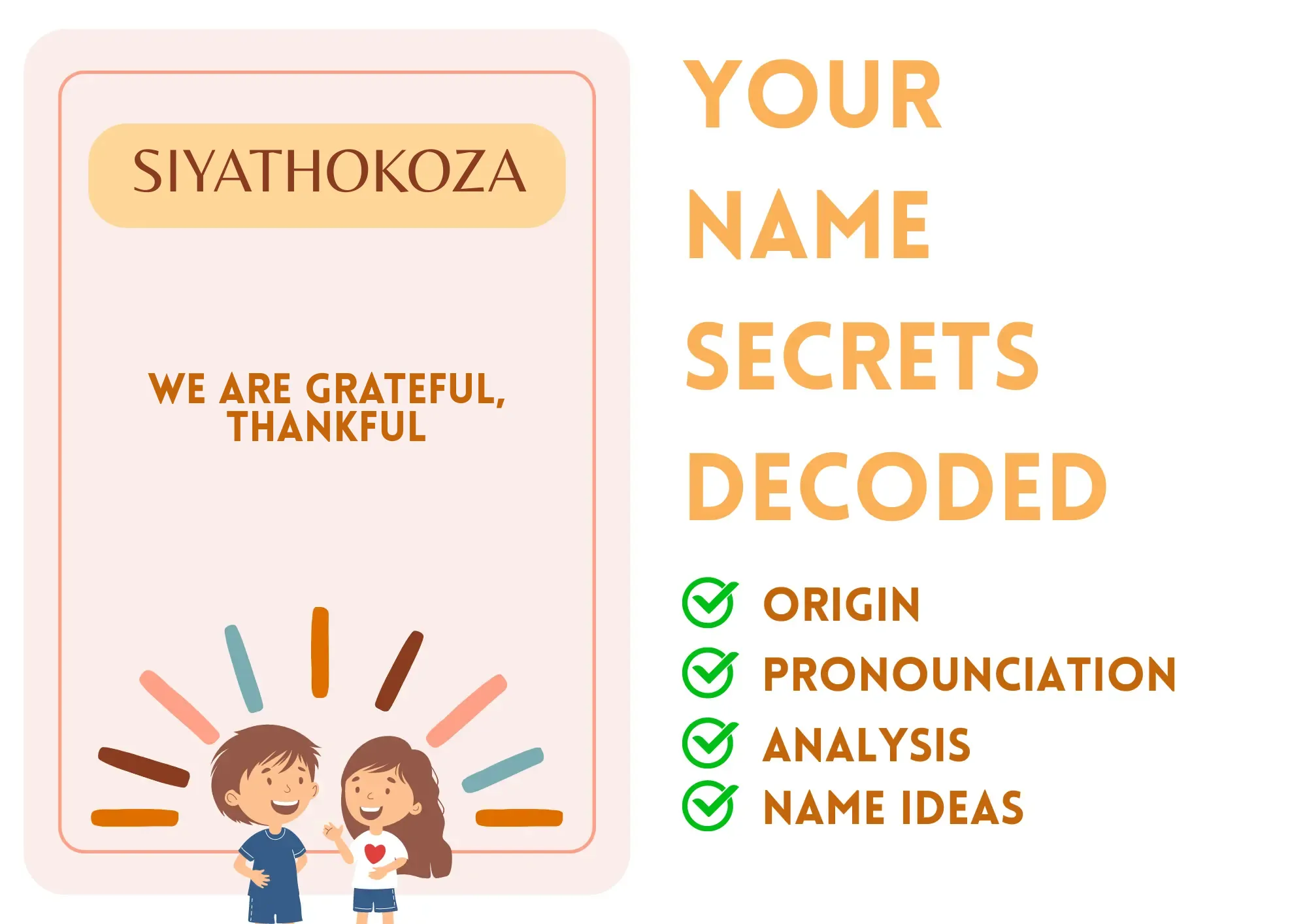
Siyathokoza
Siyathokoza is a captivating name of Zulu origin, which translates to 'we are grateful' or 'thankful'. It is predominantly used in South Africa, particularly among the Zulu-speaking population. This name embodies a strong cultural resonance, representing the value of gratitude and appreciation in Zulu culture.
Widely appreciated in various communities, Siyathokoza is considered a unisex name but may often lean towards being used for males. In a religious and cultural context, it reflects the communal values often celebrated in African traditions.
People tend to have positive feelings towards the name Siyathokoza, associating it with good character, appreciation, and community spirit. It is relatively easy to pronounce and write, with common nicknames that capture its essence.
Basic Information
Gender: Unisex
Sounds Like: see-yah-toh-koh-zah
Pronunciation Explanation: The name is pronounced in four syllables: 'see' rhymes with 'see', 'yah' as in 'yacht', 'toh' like the first syllable in 'tote', and 'koh-zah' with 'ko' as in 'coast' followed by 'zah'.
Summary and Meaning
Meaning: we are grateful, thankful
Origin: Siyathokoza originates from the Zulu language, which is one of the official languages of South Africa.
Usage: Siyathokoza is primarily unisex, used for both males and females, though more frequently for males.
Name Number (Chaldean)
Name Number (Pythagorean)
Popularity (Global Rank)
Overall: 119262
Boys: 72681
Girls:
Most Popular in
Religious and Cultural Significance
Religion: Traditional African
Background: Siyathokoza resonates with African traditional beliefs, and it emphasizes communal appreciation and spiritual gratitude.
Cultural Significance: The name is culturally significant as it embodies a core value in many African societies, often used to express gratitude for life, family, and community.
Historical Significance: In Zulu culture, expressions of gratitude and appreciation hold historical importance, linking individuals to their community and heritage. It serves as a reminder of the interconnectedness of life and the importance of being thankful.
Popular Culture
Literature and Mythology: Siyathokoza is less common in formal literature but is often referenced in cultural stories and proverbs that highlight gratitude.
Movies and Television: While specific characters by the name Siyathokoza may be rare, themes of gratitude and communal appreciation are commonly explored in South African films and television.
Feelings and Perceptions
Perception: Siyathokoza is perceived positively, often seen as uplifting and meaningful. It conveys a sense of gratitude and community spirit, making it well-received.
Positive Feelings: Meaningful, uplifting, appreciative, community-focused, warm.
Negative Feelings: Less familiar to non-Zulu speakers, might be mispronounced.
Practical Considerations
Ease of Writing and Calling: Siyathokoza consists of five syllables and is relatively straightforward to pronounce once familiar. It is moderately easy to remember but may challenge those unfamiliar with Zulu phonetics.
Common Typos and Misspellings: Siyathokozah,Siyathokozaa,Siyathkhoza,Siyhathokoza
Common Nicknames: Siyah,Tokoz,Kozi
Siyathokoza Popularity
Siyathokoza Usage and Popularity By Country
| Country | Rank (Overall) |
|---|
Siyathokoza Usage and Popularity By City
| City | Rank (Overall) |
|---|---|
| Durban | 1770 |
| Richards Bay | 649 |
| Johannesburg | 16376 |
| Newcastle | 2418 |
| Dundee | 1762 |
| Cape Town | 16000 |
Compatibility Analysis
Famous Persons Named Siyathokoza
No results found for Siyathokoza.
Related Names
Similar Sounding Names:
Siyakwazi,Siyabonga,Siyabulela